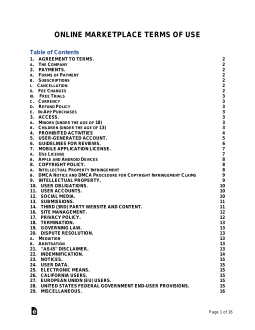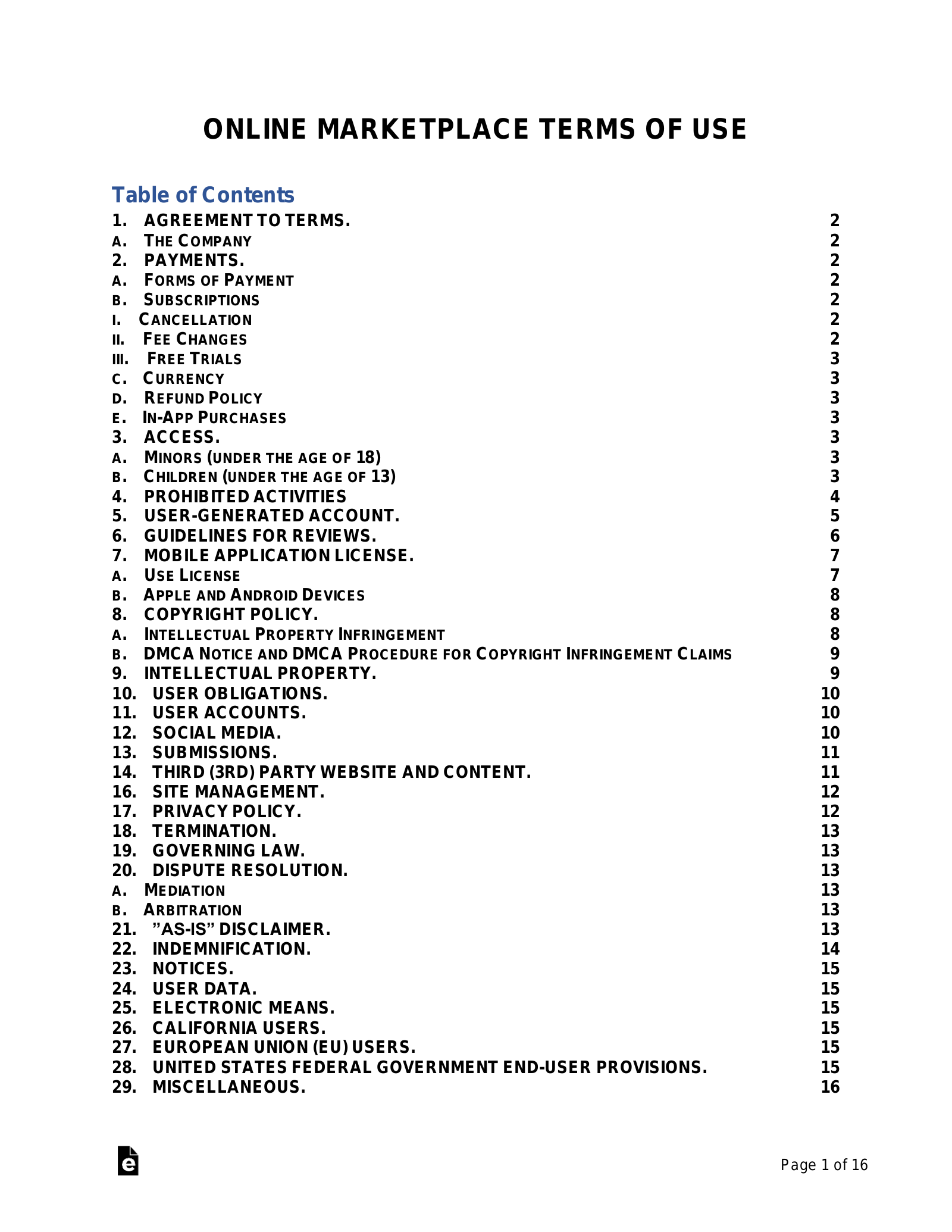Updated January 24, 2023
An online marketplace terms and conditions is an agreement created by a website that outlines the rules for buyers and sellers exchanging on their platform. The terms should be written to protect buyers and require a basic level of warranty on products and services offered.
Main Purpose (5)
- Limit Liability – Define the website’s role as a marketplace with its only responsibility to facilitate a transaction between two parties.
- Establish Rules – Outline clear and defined rules for the audience to create a level playing field for buyers and sellers.
- Taxes and Fees – List the fees for listings and taxes in the event of a sale. If payments are made on the website, processing fees should also be included.
- Protect Buyers – Safeguard buyers from defective products or incomplete services.
- Marketing Guidelines – Promote a favorable environment for sellers to encourage increased products and services offered.
What to Include (8 items) |
1. Enforcement of Policies
Outline the measures that will take effect if a user violates any of the marketplace’s rules. Users should be made aware of the process so that any type of penalty or related action can be expected.
- Buyers – Set the purchase rules and terms, including communications, warranties, and buyer protections.
- Sellers – The rules for displaying, describing, and selling offerings on the website. No transactions outside the platform or communication are generally allowed.
2. Fees
Disclosure of the fees should be mentioned, including:
- Lead Fees – If a potential customer reaches out to place a bid or offer, this is considered a “lead.” Some websites, like Thumbtack, charge for leads when receiving messages from potential clients in the hope of providing a service.
- Listing Fees – If payment is required to post products or services for sale. For example, websites like Craigslist allow users to post ads, although they do not facilitate or get involved with the communication between the parties.
- Processing Fees – If payment is offered on the website via credit card or other electronic means, a statement about the payment processing fees should be mentioned.
- Selling Fees – If a fee is paid when a sale occurs between a buyer and seller facilitated on the website, the fees should be mentioned. This is often a percentage (%) of the sale and, like eBay, depends on several factors, such as the sales price, the number of products for sale, and the product type.
3. Taxes
If a product or service is sold on a website, it should be mentioned which parties are responsible for sales taxes, value added taxes (VAT), and any other applicable levies or duties.
- USA Transactions – Sales taxes apply to where the buyer is located. An online marketplace should refer sellers to use TaxJar’s Sales Tax Calculator to find the sales tax rates in their area.
4. Listing Conditions
An online marketplace is recommended that any seller using the website to acknowledge the following:
- Approval Period – If a listing must be approved by an admin, to enter the time period and parameters for such acceptance.
- Right to Amend or Reject – The website has the right to amend, reject, and delete any listing at the website’s sole discretion.
- Responsibility – The seller should assume all liability for any product or service offered.
- Upgrades – If there are any featured listing options, to include the terms for such premium services.
5. Purchase Terms
When entering a transaction on the website, the buyer agrees to buy, and the seller agrees to sell a product or service. The seller will be obligated to deliver the promised item, and the buyer agrees to pay in full for the offering provided.
6. Content
Any content provided by a buyer or seller will be the website’s property and ownership.
- Buyer’s Reviews – Writing reviews about a seller and any of their products or services offered.
- Seller’s Descriptions – Providing a description of their products and services or giving feedback on a buyer.
7. Warranties / Return Policy
To protect both buyers and sellers, an online marketplace will generally have protections in place for both parties.
- Seller Protections – A limited return policy, so the buyer cannot use it for an extended timeframe. If an item is sold as-is, the buyer will have no recourse.
- Buyer Protections – The ability to obtain a refund if a product or service is not as described. This may require an administrative person from the online marketplace to review the dispute.
8. Indemnification
To include that the website is to be indemnified from any harm, damage, or claims made due to a transaction or lack thereof. Any claims made are to be made by the opposing buyer or seller in the transaction, and the website is solely acting as a facilitator.


